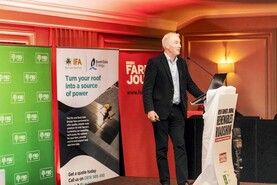Ireland’s renewable energy industry has finally gained momentum.
In this article, I run through current schemes for renewable energy generation on farms and preview what’s coming down the line.
It has been a significant year for solar PV, especially for rooftop solar.
With the practical elimination of the requirement for planning permission, a new simplified grid connection policy, revisions to VAT regulations and the introduction of a 60% grant towards the cost of a solar PV system, there has never been a better opportunity to invest in this technology on your farm and farmhouse.
Farmers who are eligible for the grant under the Solar Capital Investment Scheme are expected to see payback periods of two to four years.
Economics
While the economics of selling renewable electricity to the grid are still questionable, it is possible.
Small-scale generation scheme
The Government is in the process of developing a support scheme for Small-Scale Generation (SSG), aimed at enabling farmers, businesses, and communities to develop medium- to large-scale commercial renewable electricity projects with a capacity ranging from 50kW to 6MW.
Although the details of this scheme have not yet been announced, it is expected to be revealed soon.
This initiative has the potential to unlock opportunities for farmers to establish commercially viable medium- to large-scale renewable energy projects on their farms.
Renewable heat
A new Renewable Heat Obligation (RHO) which places an obligation on the heat sector to incentivise the use of renewable fuel is set to begin in 2024.
A technical consultation was due to be undertaken by March 2023 but has not been done yet.
The Support Scheme for Renewable Heat, which was recently relaunched, remains open for farmers.
The scheme provides an ongoing tariff for 15 years for using heat from biogas or biomass or a 40% grant on air, water and ground source heat pumps.
TAMS III also provides grant aid of between 40% and 60% for biomass boilers and air source heat pumps.
Biofuels
New rules to be introduced by the Government were set to severely disadvantage indigenous biofuel production, namely biodiesel, in favour of imported hydrotreated vegetable oil (HVO).
However, a last-minute change in the proposals reversed this decision to the relief of Ireland’s four biodiesel producers.
This biodiesel blend rate is set to increase to 20% by 2030 under the new Renewable Transport Fuels Obligation.
Biomethane
The Government’s target of producing 5.7TWh of biomethane gas by 2030, through the construction of 200 to 250 large-scale anaerobic digestion plants, remains a distant aspiration.
As it stands, the only policy instrument confirmed to support the development of the AD industry is the RHO, but industry experts believe that it falls short of providing the necessary confidence and certainty required for investors.
To construct the required number of plants, it is estimated that an investment of over €2.5bn would be necessary.
As of now, the Government’s interim target of 1TWh of biomethane by 2025 has already been missed, and the 2030 target seems highly unlikely. The Government’s National Biomethane Strategy is expected to due to be released in Q3 of this year.
Community projects
Under initiatives such as the SEAI Sustainable Energy Communities programme, there are now a number of farmer groups planning to develop community renewable energy projects, such as digestion plants and solar farms.
Biomass
The biomass industry continues to be a significant contributor to our renewable energy sector, despite not receiving the same level of support as other industries. It will continue to play a critical role in our transition to cleaner energy sources.
Large-scale projects
The third tranche of the Government’s flagship Renewable Electricity Support Scheme will soon be opened for large-scale wind and solar farm projects to apply. The country’s first Offshore Renewable Electricity Support Scheme for offshore projects will also take place soon.
It is anticipated that, by 2030, Ireland will have more than 25,000 acres of operational solar farms.
Many landowners have entered into lease agreements with solar farm developers, securing lease rates between €1,000 and €1,400 per acre for 25 to 40 years. Seeking proper legal and tax advice before entering an agreement is essential.






 This is a subscriber-only article
This is a subscriber-only article











SHARING OPTIONS: